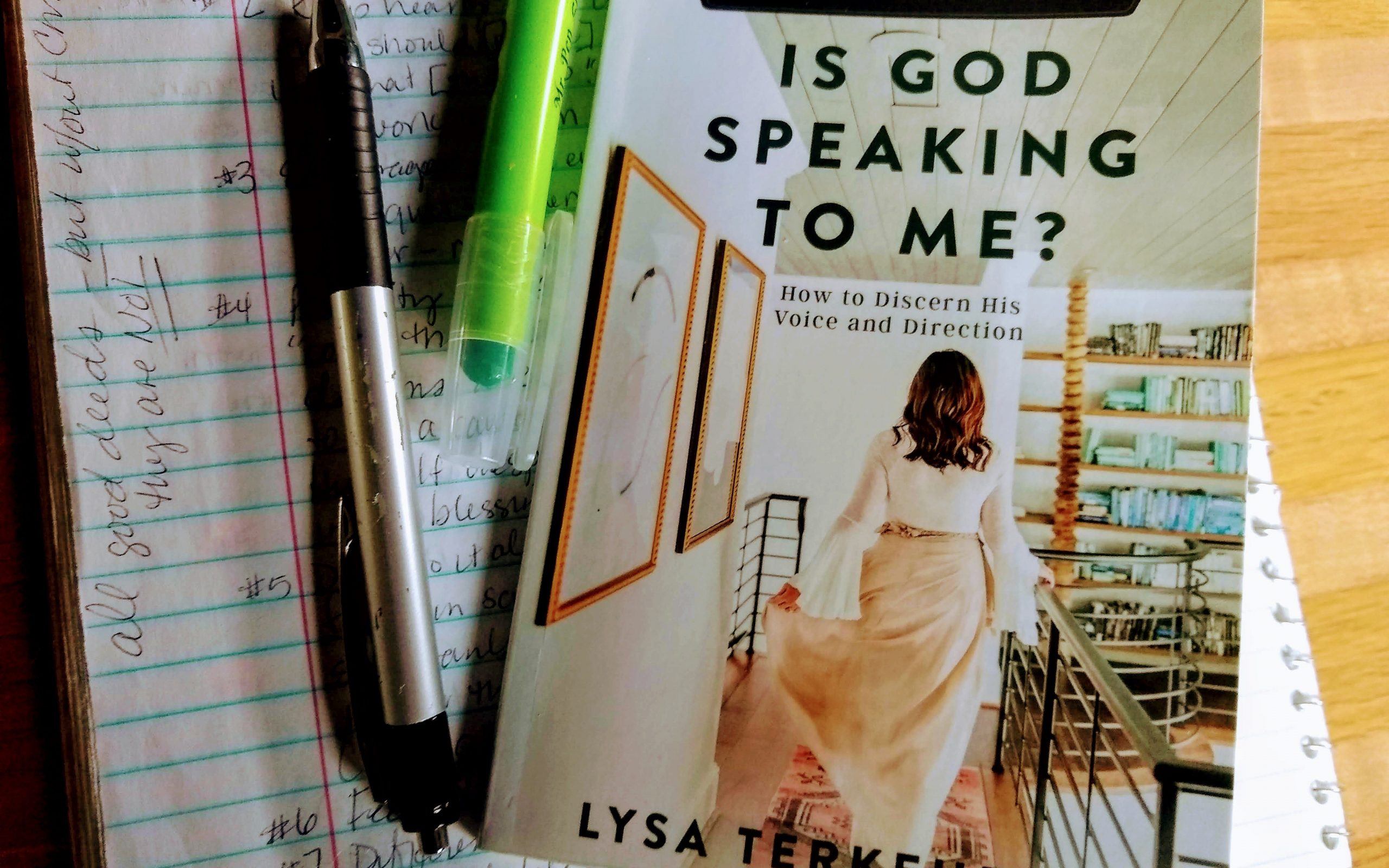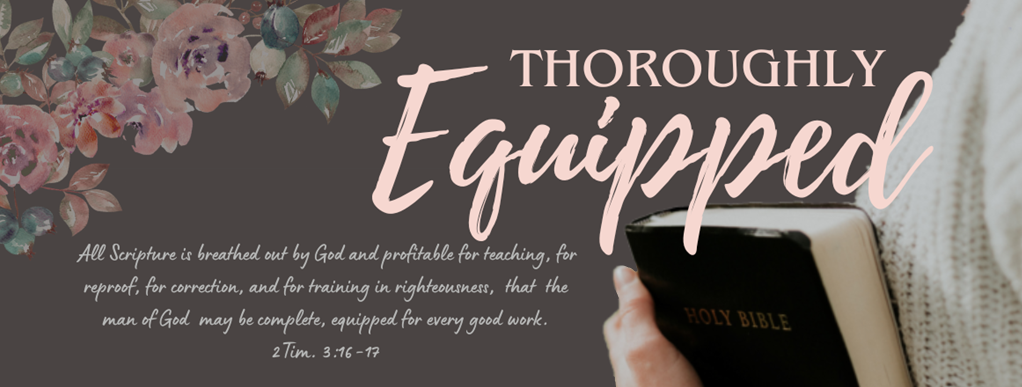Let’s look at “Is God Speaking to Me? How to Discern His Voice and Direction” by Lysa Terkeurst-Chapter 1


Only 60 pages long, this is a handy little booklet containing 3 “crucial” chapters from Lysa Terkeurst’s book What Happens When Women Say Yes to God. Going into this, I was unaware how small the book was. The title is what grabbed me. Not in a good way, mind you. My over- thinking mind immediately thought “Well, if He spoke I doubt there would even be a question.” I know, cynical, but I figured for my first book review, a short one would be perfect. So, let’s just dive in, shall we?
I think it’s right to say that people purchase books with an objective in mind. Novels entertain, Non-fiction educate, textbooks teach. Pretty much all of Women’s Ministry books are meant to encourage and teach women to get closer to God. That’s their objective, and that’s why we buy.
So let’s look at Lysa’s purpose for writing this booklet. Right away she includes a letter to us giving us just that. Her goal is to answer a need and this booklet will give us the answer. What’s the need? Knowing “…whether what [we’re] hearing is really God speaking to [us], or is it just [our] thoughts?”(pg.5). Definitely something thousands of female Christ followers long to know. This topic is probably one of the most important topics for all of God’s children. A topic I’m sure our Heavenly Father wants us to be clear in. Our God is a good Father who does not leave us in the dark wondering if He has spoken and what He wants us to do.
In fact, here’s where I want to talk a little about Sola Scriptura for a minute. Sola Scriptura is the doctrine that ALL we need for life and godliness is revealed to us in Scripture so that we may be THOROUGHLY equipped for EVERY good work (2Tim. 3:16-17). Why is this doctrine important? Two main reasons: 1) God, in His word, has told us how important Scripture is, He has told us what Scripture does. Want to know more about the result of reading God’s Word? Read Psalms 119. But in this case, the Holy Spirit tells us that Scripture thoroughly equips us, so looking for anything outside of Scripture to equip us for life and godliness would be to reject what God has said. 2) It is where we find Christ, and it is in these very books that testify of Him (John 5:39). And it is Christ who is the author and perfecter of our faith (Heb. 12:2). God’s Word reveals Christ to us and equips us to do God’s Word.
So what does Lysa have to say and how does it compare to Scripture?
Chapter 1:“A Soul That Longs For More- Whatever God says, do it.”
Her intention in the first chapter is to encourage and show us WHY we should learn to discern God’s voice (apart from Scripture).In the following paragraphs she goes into a story of how she felt God “tug” her to give away her Bible to a gentleman on the plane and how she didn’t necessarily want to give it to him but did anyway, resulting in “changed lives”. The point of the story was to show how important it is to discern God’s voice. And of course, like her, change people’s lives. In essence she believes that without being able to discern God’s voice we cannot obey God and therefore cannot truly experience Him. She says:
“how many times because I was too tired, too insecure, too uncertain, too busy, or too selfish have I walked right past [God’s] Divine appointment for me and missed experiencing [God]?” (Pg.9)
Let’s think about what we know in Scripture to see if this statement is true. Are God’s divine appointments so dependent on us? If we are so selfish and walk past a divine appointment of God’s does His will still happen? Yes! He is Sovereign! Scripture says He works in us to “both WILL and WORK for His good pleasure” (Phil. 2:13). So that desire to do that good work comes from God, as He does all that He pleases (Psalm 115:3). He “declares the end from the beginning and from ancient times things not yet done, saying, ‘My counsel shall stand, and I will accomplish ALL my purpose”(Is. 45:10).“We are God’s handiwork, created in Christ Jesus to do good works, which God prepared in ADVANCE for us to do” (Eph. 2:10.) So looking at her story about giving the man her Bible, if we look at it through the lens of Scripture we can see the Spirit “tugging” her to give it away. But we must see that God prepares these “divine appointments” in advance, working through us to do His will. We will not miss these appointments as God, in His Sovereignty is the one who works in us.
She relates that everyone has a longing for more and the solution is to get out of our comfort zones:
“Oh, Friend, the call to become a woman who says yes to God is the fresh invitation your soul is looking for. We all feel a tug at our heart and a stirring in our soul for more but we are often afraid to venture past our comfort zone. Outside our comfort zone, though, we experience the true fullness of God.“( Pg. 11)
What if a stirring in our soul for more was a result of sin? The desire for something more usually is a sign of either discontent or covetousness. Is God not what satisfies our soul? If God has blessed us with every spiritual blessing in Christ (Eph.1:3-5), what else can our soul long for? A stirring in our soul for more comes from a lack of knowing Christ and all He has done for us. The cure is not getting out of our comfort zones but to go to Scripture, and study Christ. Do we experience the true fullness of God by getting out of our comfort zones? Scripture says “…the fullness of Deity (God) dwells in bodily form. And [we] have been made complete in Christ…”(Col.2:9). You want to know the fullness of God AND to be made complete? Then you want to know Christ. Does that entail getting out of our comfort zones? Maybe. Maybe for some of us getting into Scripture can be uncomfortable. But we WILL experience the true fullness of God in Christ Jesus, who we find in Scripture, apart from whether we are comfortable or not.
She says that a prayer of surrender is a good way for one who wants to live expecting to experience God:
“God, I want to see You. God, I want to hear You. God, I want to know You. God, I want to follow hard after You. And even before I know what I will face today, I say yes to You.’ This simple act of surrender each morning will prepare your eyes to see Him, your ears to hear Him, your mind to receive Him, and your heart to receive Him. This is how to live expecting to experience God” (Pg 13).
“Women who say Yes to God are drawn in and embraced by a love like no other. They don’t have to wait until the next time they’re in church to experience God because they sense God’s presence all around them all through their day. Instead of merely walking through the motions of life they pursue the adventure of the moment -by- moment Divine lessons and appointments God has in store for them. They EXPECT to see God to hear from him, and to be absolutely filled by his peace and joy.. and, therefore, they do and they are” (Pg 13).
Is it by merely praying to surrender and saying “yes to God” that results in us living aware of God’s presence? We, By Scripture, come to know that God is EVERYWHERE. There is no place that we can go to that God does not fill (Jer.23:24, Psalm 139:7-12). God providentially works all things for His glory and our good (Daniel 4:35, Matt.10:29, Rom.8:28, 11:36). As we study the Scriptures we realize that everything is done in His providence. So as we go about our day, women of Scripture are aware of God’s presence, have peace and joy, and are “clothed with strength and dignity, laughing at the days to come” (Prov. 31:25). It is not saying “yes” that does this but the renewing of our mind in the Scriptures that produces this type of woman.
And just curious, why is there no mention of God’s Word as a number one way of experiencing God? The Scriptures are His very words. They show us Christ, and what He has done for us. The Word of God is truth and through the Spirit, they sanctify us (John 17:17).
For her Scripture is not enough to know that He is involved in her day but she needs and experience to assure her:
“I woke up feeling drained and overwhelmed. I couldn’t quite put my finger on the source of my anxiety, but I couldn’t shake it either. As I prayed my normal prayer of wanting to see and hear God I told him honestly that I really needed to see evidence of Him in my day” (Pg.14).
As I read this I immediately thought of Jesus’ parable of Lazarus and the Rich Man found in Luke 16:19-31. Notice what the Rich man requests of Abraham: that he send. Lazarus to his father’s house to warn his brothers of the afterlife. What’s Abraham’s response? ‘If they do not hear Moses and the Prophets, neither will they be convinced if someone should rise from the dead’. Jesus tells this parable in the context of explaining the Kingdom of God. His point is to tell us, quite clearly, I believe, that signs or “evidence” is not what will convince us of God. Neither will it convince us that God is working in our lives. It is the writings of the Holy Spirit through Moses, the Prophets, and the Apostles that convince us. In fact, Jesus points out from the parable that if we are not convinced by God’s Word, neither will some “divine appointment” or “experience” convince us. Even Peter points to Scripture as “more fully confirmed” than even the experience of seeing Jesus in His Glory (2Pet. 1:16-21)!
(This need for “more” is a common issue she hears in her travels. She will get into this a little more later on).
After praying to see evidence of God in her day she recounts how she narrowly missed getting her hand stabbed by a blade upside down in a glass she was reaching for. Immediately, she says, she “knew God’s presence was there”(pg.14). Why did it take providential protection over her hand to know that God was there? Is Scripture not enough to tell her that God is Sovereign over all things? She was drained and overwhelmed, could not Scripture give her what she needed? Is meditating on Christ and His work on the Cross not comforting enough? Saving her hand was evidence to her that God was involved in her day, but not His own Words that say He will never leave us, or that The Spirit will be with us forever? (Matt. 28:20, Heb. 13:5, John 14:16, Rom. 8:38-39).
She relays that:
“being a woman who says yes to God means making a choice to trust Him even when [we] can’t understand His requirements”(pg.16)
Does she ever wonder how God can do His good and pleasing will if He cannot relay to His children what is required of them? How powerful is this God of hers? And does she understand that to not obey God’s requirements is to sin. Any requirement of God must be obeyed or results in His wrath. So, as a loving father does, He tells us what He requires. The God of the Bible has made clear His will to us, that we believe in Jesus Christ and love one another (1John 3:23).
“This kind of obedience,” she says, “invites you to embrace a bigger vision of your life. When you look at your everyday circumstances through the lens of God’s perspective, you come to see each situation, each person who crosses your path, each encounter with him as a divine appointment. Each day counts, and every action and reaction matters. God absolutely loves to take ordinary people and do extraordinary things in them, through them, and with them” (Pg.16).
At some level this is true but only if you define “extraordinary things” more accurately. The lack of clarification can be misleading. What does she mean by extraordinary? Does she mean that God takes us ordinary Christian women, who day- to- day love, respect, and submit to our husbands, use these good works to His pleasure and purpose? Or that our service to our children, toiling away to teach, comfort, protect, and guide them is used by God? Or that the cleaning and maintaining of a household becomes extraordinary because it is done in faith?
While there are examples of men doing extraordinary things in God’s word. He mostly works hidden in the mother serving her children dinner, washing dishes, changing diapers, resolving sibling rivalry, submitting and respecting her husband. These works are extraordinary, holy, right and good when done in faith for it is faith that pleases God (Heb. 11:6). Martin Luther says it brilliantly “Oh, if a man were so to regard himself and his position, and attended to its duties alone, how rich in good works would he be in a short time, so quietly and secretly that no one would notice it except God alone!”― Martin Luther, A Treatise on Good Works
She goes on to claim that:
“God reveals himself and his activity to all of us but very few really want an encounter with him. Divine encounters cause extreme changes in our plans, our perspectives, and our personhood, and most of us hate change. But protecting ourselves from change only leads to boredom“(pg.18).
Divine encounters can lead to change, think of Judas, think of the disciples. Divine encounters will/can change for good or for bad. Scripture says we should not be looking for divine encounters with God. Peter had a divine encounter. He saw Christ in his glory and heard the voice from Heaven. And yet, Peter says we have something more sure than encounters… God’s word (1 Pet.1:16-21). God’s word changes our perspectives, gives us the mind of Christ, and our personhood (sanctification). It always changes for good.
The remaining chapter continues on to mention her encounter with people who want something more in their Christian life and she’s found the key to fix that longing. We will analyze what she says about that in Chapter 3.
Underneath her claims is the assumption that we can experience God apart from Scripture. I hope, in this part of the critique I have shown how some of her claims contradict Scripture. Scripture is so much better than any experience we may have because it is more sure, we can fully trust it. If we long for more, let us go and immerse ourselves in it. Let us search the Scriptures for Christ and find Him.
In the next Chapter she will go into WHAT God’s voice is (cause clearly it’s not an audible one if we have to learn how to discern it) and HOW to discern it. Till next time…
Let us be in God’s Word,
Melbatoast




Recent Comments